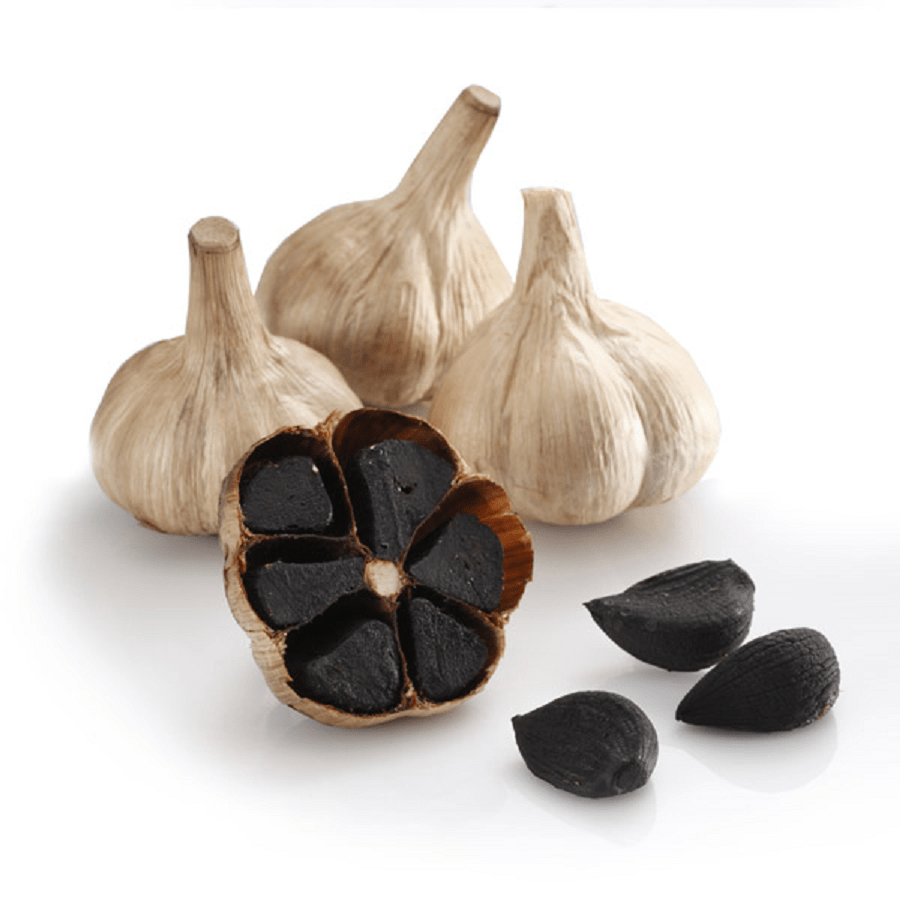Fermentierter Knoblauch
Allium sativum L. – Alliaceae

Fermentierter Knoblauch wird durch einen Fermentationsprozess gewonnen, bei dem frischer Knoblauch über einen längeren Zeitraum einer erhöhten Temperatur und Feuchtigkeit ausgesetzt wird. Während des Fermentationsprozesses finden im Inneren des Knoblauchs zahlreiche chemische (vor allem die Maillard-Reaktion) und enzymatische Reaktionen statt, die zu einer Veränderung der Farbe (von weiß zu dunkel/schwarz) und des Geschmacks (er wird süß-säuerlich) führen und der charakteristische scharfe Geruch geht verloren. Durch die Fermentation erhöht sich auch der Gehalt an Polyphenolen und Flavonoiden, die die wichtigsten Träger der antioxidativen Eigenschaften sind. Außerdem wird das instabile Alliin in das stabile S(+)-Allylcystein umgewandelt, das als die am häufigsten vorkommende bioaktive Substanz gilt und dem folgende gesundheitliche Vorteile zugeschrieben werden:

1. Ein starkes Antioxidans;
2. Verhindert entzündliche Prozesse (entzündungshemmende Wirkung);
3. Verbessert den Lipidstatus (reduziert Fettleibigkeit);
4. Schützt das Herz und die Blutgefäße (kardioprotektive Wirkung);
5. Wirkt sich auf die Regeneration und den Schutz der Leber aus (hepatoprotektive Wirkung);
6. Senkt den Blutzucker (hypoglykämische Wirkung);
7. Hemmt das Wachstum von Tumorzellen (antitumorale Wirkung);
8. Schützt und regeneriert Nervenzellen (neuroprotektive und neuroregenerative Wirkung);
Referenzen
- Black Garlic Improves Heart Function in Patients With Coronary Heart Disease by Improving Circulating Antioxidant Levels
- The Effect of Black Garlic (Allium sativum Linn) on Cardiac and Aortic Histopathology in Experimental Studies in Obesity Rats
- Effects of an Optimized Aged Garlic Extract on Cardiovascular Disease Risk Factors in Moderate Hypercholesterolemic Subjects: A Randomized, Crossover, Double-Blind, Sustainedand Controlled Study
- In vitro studies of an aged black garlic extract enriched in S-allylcysteine and polyphenols with cardioprotective effects
- Black Garlic and Its Bioactive Compounds on Human Health Diseases: A Review
- Impact of steaming pretreatment process on characteristics and antioxidant activities of black garlic (Allium sativum L.)
- Modulation of local and systemic immune responses by fermented garlic extract
- Immune Competence and Minimizing Susceptibility to COVID-19 and Other Immune System Threats
- Chloroform extract of aged black garlic attenuates TNF-α-induced ROS generation, VCAM-1 expression, NF-κB activation and adhesiveness for monocytes in human umbilical vein endothelial cells
- The effects of allium sativum on immunity within the scope of COVID-19 infection
- Garlic (Allium sativum L.): a potential unique therapeutic food rich in organosulfur and flavonoid compounds to fight with COVID-19
- Herbal and Natural Dietary Products: Upcoming Therapeutic Approach for Prevention and Treatment of Hepatocellular Carcinoma
- Dietary Natural Products for Prevention and Treatment of Liver Cancer
- Black Garlic and Its Bioactive Compounds on Human Health Diseases: A Review
- Neuroprotection by spice-derived nutraceuticals: you are what you eat!
- Protective effects of functional foods against Parkinson’s disease: A narrative review on pharmacology, phytochemistry, and molecular mechanisms
- Gastroprotective effect of garlic in indomethacin induced gastric ulcer in rats
- The Protective Effect of Aged Garlic Extract on Nonsteroidal Anti-Inflammatory Drug-Induced Gastric Inflammations in Male Albino Rats
- Onion and garlic intake and the odds of benign prostatic hyperplasia
- Potential of S-Allyl Cysteine, a Major Bioactive Component of Garlic, As Hypoglycemic and Hypolipidemic Agent
- Lactobacillus bulgaricus improves antioxidant capacity of black garlic in the prevention of gestational diabetes mellitus: a randomized control trial
- Effect of Garlic and Aged Black Garlic on Hyperglycemia and Dyslipidemia in Animal Model of Type 2 Diabetes Mellitus
- Antioxidant effect of garlic and aged black garlic in animal model of type 2 diabetes mellitus
